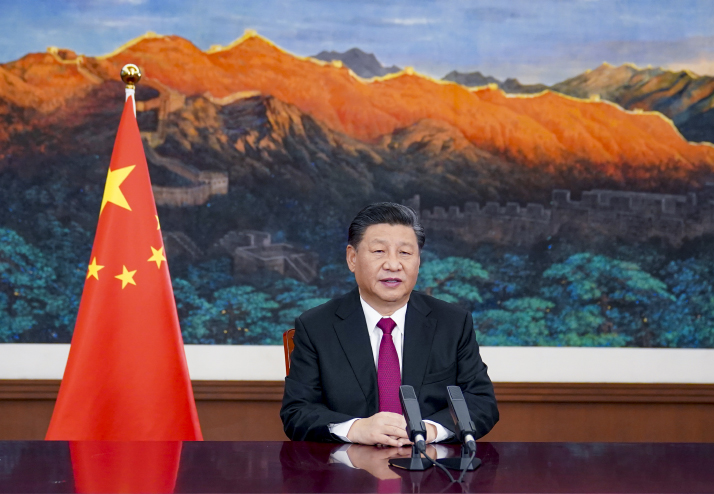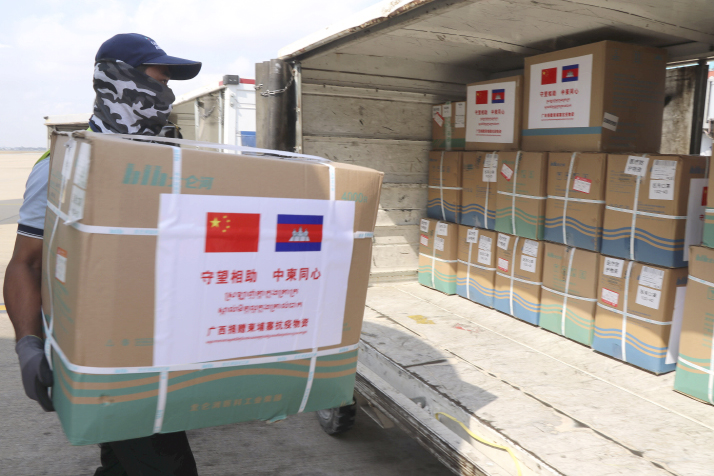| World |
| Concerted efforts must be made across the globe to lift the world out of COVID-19 quagmire | |
|
|
 President Xi Jinping makes a special address at the World Economic Forum Virtual Event of the Davos Agenda via video link from Beijing on January 25 (XINHUA)
"History is moving forward and the world will not go back to what it was in the past. Every choice and move we make today will shape the world of the future," Chinese President Xi Jinping said in his special address at the World Economic Forum Virtual Event of the Davos Agenda, held on January 25.
With the world mired in a pandemic, Xi shared China's answer to the choice nations could make to save their people and the stagnant economy and unite a divided society. Multilateralism should be the torch to light up the way forward. Xi defined multilateralism as addressing global affairs through consultation and everyone working together to create the future of the world. "We cannot tackle common challenges in a divided world, and confrontation will lead us to a dead end. Humanity has learned lessons the hard way, and that history is not long gone. We must not return to the path of the past," he cautioned. Pandemic aftermath None of the prevailing problems such as a raging pandemic, the worst recession since the end of World War II, and a huge gap between developed and developing countries can be solved once and for all by one country alone in the era of globalization, Xu Feibiao, an associate researcher with the China Institutes of Contemporary International Relations, told Beijing Review. "That's why Xi tirelessly calls for multilateralism," he said. The pandemic has had huge repercussions. Over 2 million people worldwide lost their lives, 150 million are likely to be left in extreme poverty, and the equivalent of 255 million jobs were wiped out, according to World Bank estimates. Resolving such a large-scale crisis is far beyond one country's power; that's why the international community needs cooperation more than ever, Xu said. Xu Xiujun, a researcher with the Institute of World Economics and Politics, Chinese Academy of Social Sciences, echoed the same point. "The world is interconnected and no country can stand aloof," Xu Xiujun told Beijing Review. But as Xi said, the multilateralism countries pursue should not be "selective multilateralism." Some countries decide whether to promote multilateralism based on whether they gain from it. For example, the U.S., once the advocate of free trade and a supporter of the World Trade Organization (WTO), has repeatedly blocked the selection of new arbitrators for the WTO Appellate Body that hears the complaints and disputes of member economies. Saying no to selective multilateralism also means rejecting building small coteries or starting a new Cold War. "While former U.S. President Donald Trump's general approach was to undermine and abandon multilateralism, President Joe Biden is more likely to re-engage but with the aim of strategic competition," Josef Gregory Mahoney, professor of politics at the East China Normal University in Shanghai, told Beijing Review. Moreover, willfully imposing decoupling, supply chain disruption or sanctions will only push the world into division and even confrontation, taking a toll on all those who are involved. The U.S. ban on selling chips to China is a case in point. Sixty percent of the chips manufactured by American companies Qualcomm, Broadcom and Intel are exported to China. So if the huge Chinese market is banned from using these chips in the future, these companies would suffer a heavy loss. "The lack of coordination in pandemic response measures, in macroeconomic policies and many other fronts made novel coronavirus disease (COVID-19) hit us harder than predicted," Xu Xiujun said. Ensuring rapid recovery of the world economy is the primary task for the post-pandemic world. Multiculturalism and stepping up macroeconomic policy coordination are essential. "Now the U.S. is waiting for Biden's promised $1.9 trillion [stimulus plan] with little consideration of how it will produce benefits that outweigh the costs," Mahoney said. "Such quantitative easing developments have global implications, insomuch as the U.S. economy will continue to be crisis-prone. It will not be a reliable engine of growth. Meanwhile, the dollar will be manipulated throughout to respond to America's domestic woes without considering how it impacts the global economy, given its continued position as the world's de facto supranational currency."  A worker carries medical supplies provided by China for Cambodia at the Phnom Penh International Airport in Cambodia on March 23, 2020 (XINHUA)
China's role "China will continue to take an active part in international cooperation on COVID-19," Xi committed. It will continue to implement the win-win strategy of opening up, promote sustainable development and advance science, technology and innovation. It will also promote a new type of international relations. The most urgent task for the international community is to wipe out the virus. According to Zhang Boli, an academician of the Chinese Academy of Engineering, China's COVID-19 control and prevention has reached a critical stage. The recent resurgence of the epidemic is estimated to be fully under control in March. "China will continue to provide medical supplies, such as personal protection equipment and vaccines, to countries in need," Xu Feibiao said. Moreover, in contrast to the trade protectionism adopted by some countries, China will expand its opening up to share its potential market with the rest of the world. A multitude of platforms and initiatives have been introduced for this purpose. Three editions of the China International Import Expo have been held in Shanghai, offering foreign companies opportunities to attract Chinese consumers. Regional trade and investment agreements such as the Regional Comprehensive Economic Partnership have been signed, which would enable more foreign investors to seek profit in China. These efforts will provide more cooperation opportunities to other countries and give impetus to global economic recovery and growth. China will also do more on the ecological front. It will transform and improve its industrial structure and energy mix at a faster pace and promote a green, low-carbon way of life and production. "It is an ambitious target to peak carbon dioxide emissions before 2030 and achieve carbon neutrality before 2060," Xu Feibiao said. In the era of economic globalization, global emergencies like COVID-19 may recur, and require coordinated governance. "To scale up efforts to address worldwide problems bears on the future of humanity. There must be global action, global response and global cooperation," he stressed. (Print Edition Title: Call for Unity) Copyedited by Sudeshna Sarkar Comments to wenqing@bjreview.com |
|
||||||||||||||||||||||||||||||
|
